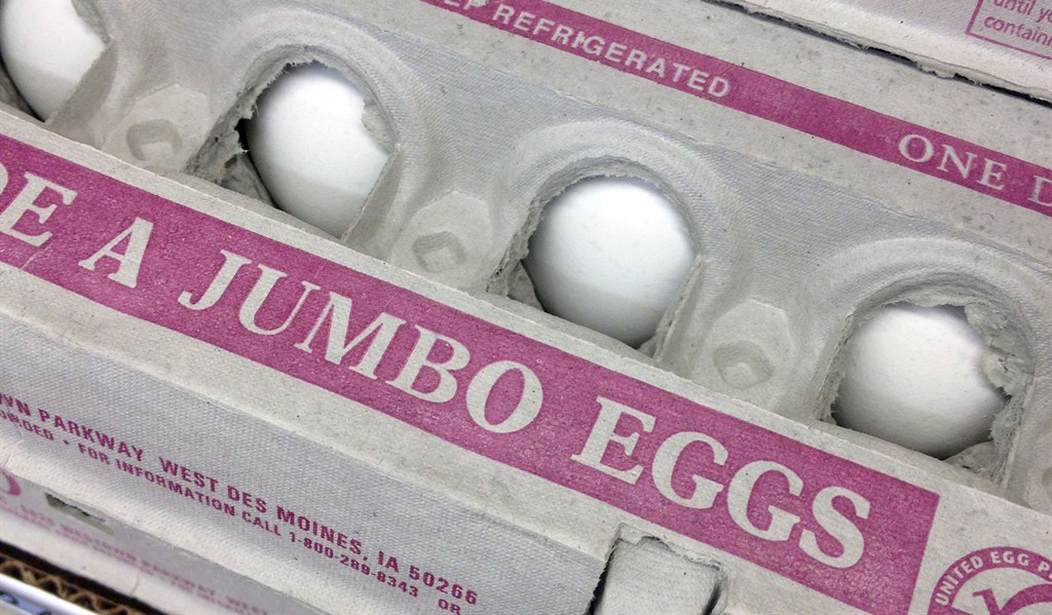Whether you're planning to make a platter of deviled eggs or bake your favorite cakes, pies, and cookies, you may not find eggs on your grocery shelves this holiday season. The United States has been facing a bit of an egg crisis over the last couple of years that has led to everything from shortages to higher prices, but experts suggest things could get worse going into 2025, just in time for this year's Thanksgiving and Christmas meals.
According to a report from the U.S. Department of Agriculture, egg production was down 2.6% in October 2024 compared to the same month last year. An outbreak of the avian flu — that that has been in the U.S. since January 2022 and has since spread to 49 states and impacted over 100 million chickens — is said to be to blame. But just like everything else, even the reasons behind the egg shortage are controversial and up for debate.
Many grocery shoppers have noted that in place of eggs on the shelves at stores like Whole Foods and Trader Joes, they've seen signs that say "Where are the eggs? We’re transitioning to cage-free only which may temporarily reduce our supply. Thank you for your patience!" and "We are currently experiencing difficulty sourcing eggs that meet our strict animal welfare standards."
Several states, like California, Massachusetts, Colorado, Nevada, Oregon, and Washington, have laws in place that state that eggs must come from indoor or outdoor cage-free housing systems. Grocery stores like Whole Foods will only sell cage-free eggs, regardless of geographic location, to meet their own animal welfare standards.
Bill Scebbi, the executive director of the Colorado Egg Producers, says those signs are creating controversy that isn't there and that the avian flu is truly to blame. "Farms have had to decrease their flocks by over 100 million hens. When you take that many hens out of the system, you don't get eggs. That's just the bottom line," he told Denver's ABC affiliate.
The American Egg Board President and CEO Emily Metz told Newsweek: "The impact of this on America's egg farmers has been incredibly tough. Highly Pathogenic Avian Influenza (HPAI) is absolutely devastating to those farmers. These birds are their livelihoods. Our supply is tighter than normal due to HPAI, and in some states more than others."
Even if you are able to find eggs this holiday season, prepare to pay more. The U.S. Bureau of Labor Statistics reports that the price has soared a whopping 30.4% compared to October 2023.
My advice? Get to know your local farmers or that neighbor who raises backyard chickens and sells eggs on the side of the road. An estimated 85 million Americans keep chickens, either as pets or to have their own egg supply, and many of us are happy to sell or even give eggs away to our friends and family.
I've kept chickens for years, and I'm always willing to share eggs with my neighbors. That really came in handy during the pandemic when certain groceries could be hard to find at time, and if predictions about a 2025 egg shortage are true, my little flock of hens (and ducks) will come in handy once again. By the way, if you're baking, you can substitute a duck egg in place of a chicken egg for amazing results.
It's also important to note that eggs are often good long past the expiration dates you find on the cartons, so you could possibly get through Thanksgiving with the ones you still have in the fridge. The USDA suggests that eggs can be kept up to 5 weeks in your refrigerator once you purchase them. If you're unsure about an egg, there are several ways to determine if it might be bad, but a float test is the most common one. To do this, just drop your egg in a glass of water. If it sinks to the bottom, it should still be good, but if it floats, you'll want to throw it away.










Join the conversation as a VIP Member